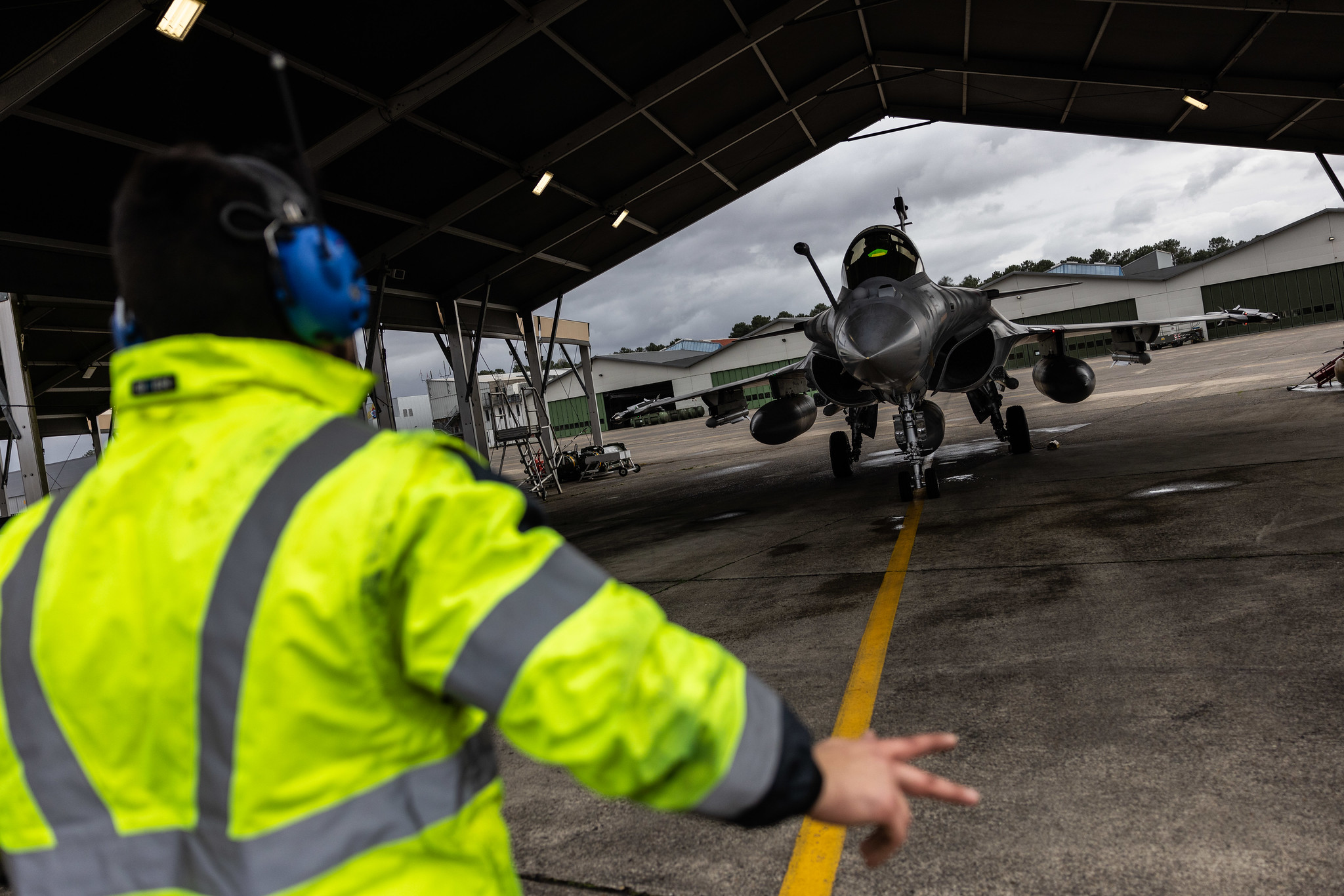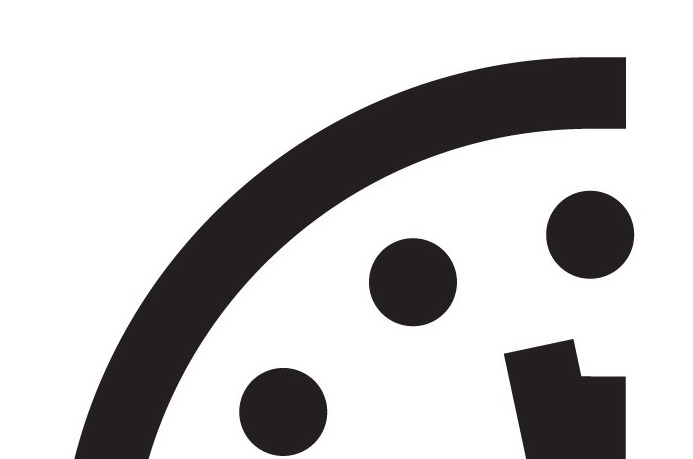Nearly three-quarters of polled respondents thought the Russian invasion of Ukraine has increased the likelihood that nuclear weapons will be used anywhere in the world.

A French fighter aircraft prepares to patrol skies over Poland, March 4. (NATO)
Russia’s invasion of Ukraine has left Americans on edge, according to a recent poll which found a majority of people in the U.S. are worried that the war has made the impending use of nuclear weapons more likely.
Nearly three-quarters of respondents told the Associated Press and NORC Center for Public Affairs Research that the invasion has increased the likelihood that nuclear weapons will be used anywhere in the world.
Eighty-five percent of people surveyed said they were concerned that the U.S. could be drawn into the conflict, including 47 percent of people who said they were “extremely or very concerned” about this scenario, which would amount to a conflict between the two countries with the world’s largest nuclear stockpiles.
Putin & Biden
Russian President Vladimir Putin raised alarm when he placed his country’s nuclear weapons on high alert days after invading Ukraine. In the U.S., President Joe Biden last week unnerved international observers when he appeared to call for the Russian president’s removal from power.
“Whenever you have nuclear-armed nations getting closer to conflict, there’s always a risk of nuclear escalation,” Tara Drozdenko, director of the global security program at the Union of Concerned Scientists, told the AP.
 Weeks before Russia’s invasion, the Bulletin of the Atomic Scientists announced that its “Doomsday Clock,” established in 1947 after the U.S. bombed Nagasaki and Hiroshima at the end of World War II, remains at “100 seconds to midnight” for the third year in a row—a status attributed in part to U.S. and Russian nuclear modernization efforts.
Weeks before Russia’s invasion, the Bulletin of the Atomic Scientists announced that its “Doomsday Clock,” established in 1947 after the U.S. bombed Nagasaki and Hiroshima at the end of World War II, remains at “100 seconds to midnight” for the third year in a row—a status attributed in part to U.S. and Russian nuclear modernization efforts.
“For many years, we and others have warned that the most likely way nuclear weapons might be used is through an unwanted or unintended escalation from a conventional conflict,” said the Bulletin of the Atomic Scientists earlier this month as Russian forces battered Ukrainian cities and more than 3.7 million people fled the country.
“Russia’s invasion of Ukraine has brought this nightmare scenario to life, with Russian President Vladimir Putin threatening to elevate nuclear alert levels and even first use of nuclear weapons if NATO steps in to help Ukraine. This is what 100 seconds to midnight looks like.”
Eighty-seven percent of respondents to the AP poll said they were at least “somewhat concerned” that Putin could use nuclear weapons against Ukraine, and 75 percent were concerned that the U.S. could be targeted.
Since the invasion, anti-war and arms control groups have intensified calls for Biden to commit to a no “first-use” policy, affirming that the U.S. nuclear arsenal is only a deterrent and will never be used in an offensive strike.
The Wall Street Journal reported last week, however, that the president has abandoned his campaign pledge to establish an official policy to that effect.
This article is from Common Dreams.

Russia sent its Pacific submarine fleet to sea in January from its base in Vilyuchinsk, according to a Russian news agency. This includes state of the art Borei-class stealth boats as well as the older but quite capable Akula-class vessels already deployed. One of the former was reported to have appeared quite near US territorial waters last week, her approach undetected until the boat surfaced in order to be seen. She carries a nominal complement of sixteen Bulava missiles, each equipped with ten nuclear warheads, giving this single vessel the capacity to obliterate much of the United States. There are perhaps ten of both types of sub thought to be operational at present.
As a general rule it is a very serious error to push the bear into a corner – just ask the late unlamented Fuehrer. With the devilishly rabid Russia-hate propaganda apparently being so eagerly devoured, it feels like August 1914 again, sleepwalking into unimaginable catastrophe, waving a foreign state’s flag and blabbering about freedom all the way.
This film should be screened daily in NATO countries, it may stop the gung ho BS I’m reading on the bbc and msm
hxxps://youtu.be/vgT4Y30DkaA
I watched it when it came out and it will be forever etched in my mind
If Biden’s job is to protect us he’s failing miserably.
Hell yeah I’m afraid of nuclear war – these so called leaders are nuts – Especially Biden!!
Well I trust those Atomic Scientists, they’ve studied this stuff and know what they’re talking about. So this is the “perfect storm” as it were for nuclear Armageddon. I’m in a constant state of panic about it, to the point where I can’t even turn on most news coverage, because every story and narrative seems to bring us closer to the brink. And who can trust our leaders and their advisors to be wise and intelligent?
I have lost most of the respect I once had for the Bulletin of the Atomic Scientists over the last year or so. They’ve been peddling the worst kind of one-sided analyses on the Ukraine-Russia conflict that I’d expect to find on any other mainstream, pro-NATO rag. And before that, they were propping up the China lab leak garbage full of source misrepresentation and straw manning. These kind of one-sided, chauvinistic analyses make the world more prone to nuclear instability, not safer. They’ve thrown away their responsibility and more importantly their CREDIBILITY as an atomic watchdog and it’s been disgusting to watch.
And I’d like to clarify: the reason these kinds of analyses make the world more prone to nuclear instability is they manufacture consent for American bellicosity.
Definitely spot on with both your points. So what is it that drives this near complete social conformity? The “social media?”–to which Sara Palin first brought conspicuous attention during her campaign with McStain? Before then everyone was not checking their smart phones 24/7 to find out what they were supposed to believe. Sure did not take much in the way of money or influence for that modality to be monopolised by corporate power and interests, did it? Like some people avoid television, I am glad not to own one of those contraptions to be constantly mesmerized by it.
“Majority of Americans Fear Nuclear War”
Sure, Louis MacNeice had words for it:
Sit on your arse for fifty years
And hang your hat on a pension.
Likely not popular in social relations where everyone else is to blame.
My generation grew up under a nuclear reign of terror. We called it the Cold War. For us, a nuclear, and world destroying war and nuclear winter, was an absolute evil. We all understood nuclear war and its ensuing world-wide holocaust not in theory but in a deeply visceral way, a daily-life reality as we grew up, always under a cloud, for about 45 years until the fall of the Berlin wall and an almost miraculous end to the Cold War. Not to mention that in retrospect it has become clear that it was mainly the US that created and nurtured the first Cold War as a national “business model.” The banality of evil, and now, nothing new under the sun…
For the generations that grew up after the Cold War, and who, notably, are the ones that are passionately driving the current, and contrived, conflict with Russia in Ukraine, a nuclear war and the end of the world that it brings is merely an abstraction, something to be “managed.”
This is a profound difference with terrifying implications. Apparently, it is not the “bad guys” who will destroy the world, but rather the “world’s leading democracy,” either through nuclear war or climate neglect, that will bring humanity to its knees. “Hell of a job…”
I turned seven at the very height of the Cuban Missile Crisis and that has imprinted my worldview ever since. Younger
generations do not have the same sense of existential angst that mine has. One friend recalls that, after ‘duck and cover’
drills in her elementary school, classes were always dismissed for the rest of the day. She would walk home, alone. An
imaginative child, sometimes she imagined that The Bomb really had gone off, and she was in the Afterlife. Then she
would arrive home to find her mother vacuuming, and realize that if it was the Afterlife, her mother would not be vacuuming.
Adults pretended that everything was ok, but the children knew otherwise. I knew that we had neighbors who had, literally,
built a bomb shelter. And that they would lock the door once ‘safely’ inside.
The best treatise on the nuclear threat was written in the early 1980’s by eminent historian Paul Boyer. “By the Bomb’s
Early Light” is highly recommended and affordably available through used book sellers. His book opens with a description
of October 25th, 1992 (my 7th birthday), as Paul sits in a university classroom completely unable to focus on anything but
the clock on the wall, ticking towards a noon deadline. He goes on to describe in detail just how thoroughly early post-WW2
writers understood the changed nature of conflict after Hiroshima and Nagasaki, and how eloquently they wrote in the interest of averting future disaster. And he makes the very credible argument that the greatest threat was not the Cuban
Missile Crisis, or the ‘Star Wars’ crisis of the time the book was published, but ‘sometime in the future’, when the original
experience of nuclear peril had themselves passed away, the world had become inured to talk of nuclear armageddon, and
new generations were embroiled in regional resource wars, with nuclear weapons always lurking in the background.
With all the potential that our species seems to have, it’s been a crime the way so much talent and resources have been squandered on our preoccupation with war, especially in devising nuclear devices and plans for their use which would accomplish nothing but driving our kind to extinction. It’s quite illogical, insane actually, that so much of our genius has been dedicated to arranging our own self-destruction. Who knows what the ET’s must be thinking, other than 4.5 billion years of evolution gone for naught on Planet Earth.
This film should be screened daily in NATO countries, it may stop the gung ho BS I’m reading on the bbc and msm
hxxps://youtu.be/vgT4Y30DkaA
I watched it when it came out and it will be forever etched in my mind
Count me in as one of those very concerned about the high probability of nuclear war. And I see that concern all around me. my wife and I simply do not discuss the Ukraine conflict. It certainly is not something I would bring up at the grocery store check-out (although I did notice that the National Enquirer had a bold eye-catching headline: ‘World War 3 Only Weeks Away’, or words to that effect. We went to a dinner party a week ago, and the topic never came up (for which I was grateful), although we were not afraid to talk about other problems such as global warming or the general decline of everything.
I’ve had a nice life and I don’t fear death. Just the same, these times make me feel a bit queasy.
La Russie, comme la France, respecte la dissuasion nucléaire: c’est-à-dire une utilisation de l’arme atomique seulement qu’en riposte; ce qui n’est pas du tout le choix de Washington, lui qui se réserve le droit absolu de lancer ses ogives nucléaires sur qui que ce soit, et cela, sans aucun avertissement: c’est-à-dire sans être attaqué de prime-abord.